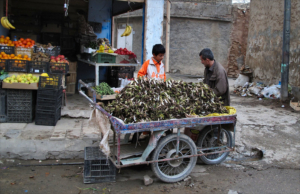Fragility and Rule of Law in Iraq
 Iraq has long been a country plagued by instability, insecurity and violence. One of the key factors contributing to this ongoing problem is the lack of a strong and sustainable rule of law. Despite numerous efforts to strengthen and address the fragility and rule of law in Iraq, obstacles remain. These obstacles have allowed non-state actors to gain influence and power, further exacerbating the situation and deeply impacting the nation’s weakest; those living in poverty. From the legacy of strict rule and sectarianism to ongoing political upheaval and regional instability, the path to building a strong and sustainable rule of law in Iraq is not without obstacles. However, with a clear understanding of the challenges and a commitment to finding solutions, it may yet be possible to make progress toward a more peaceful and stable future for the people of Iraq.
Iraq has long been a country plagued by instability, insecurity and violence. One of the key factors contributing to this ongoing problem is the lack of a strong and sustainable rule of law. Despite numerous efforts to strengthen and address the fragility and rule of law in Iraq, obstacles remain. These obstacles have allowed non-state actors to gain influence and power, further exacerbating the situation and deeply impacting the nation’s weakest; those living in poverty. From the legacy of strict rule and sectarianism to ongoing political upheaval and regional instability, the path to building a strong and sustainable rule of law in Iraq is not without obstacles. However, with a clear understanding of the challenges and a commitment to finding solutions, it may yet be possible to make progress toward a more peaceful and stable future for the people of Iraq.
Rule of Law
Since the fall of Saddam Hussein, Iraq has made progress in building a more effective and sustainable rule of law. However, significant challenges still remain. Corruption, sectarianism and weak institutions continue to pose obstacles to the development of a truly robust legal system in Iraq.
The ongoing conflict with the Islamic State (ISIS) has brought to light the fragility of Iraq’s legal system, particularly in relation to the treatment of civilians and the use of military courts. The situation highlights the need for Iraq to ensure that its counter-terrorism measures adhere to human rights and the rule of law.
The crisis of the rule of law has global implications that reverberate throughout the international legal order and national legal systems. The post-9/11 fallout from the “war on terror” has contributed to this crisis as organizations such as Al-Qaida and the Islamic State challenge the existing systems of government both nationally and internationally. The ripple effect of this crisis extends far beyond the borders of Iraq and Syria, impacting legal systems worldwide.
The People of Iraq
Fragility and rule of law in Iraq have contributed significantly to the country’s poverty crisis. A 2021 report by NPR stated that corruption, political instability and weak institutions have hindered economic growth and development in Iraq, leading to rising poverty levels. The report further highlighted that the country’s legal and regulatory framework is often opaque and inconsistently applied, making it difficult for businesses to operate and for individuals to access justice.
This has resulted in a lack of investment, high unemployment rates and a struggling private sector, leaving millions of Iraqis living in poverty. According to the World Bank, approximately a quarter of Iraq’s population lives below the national poverty line, which translates to more than 8 million people. The lack of a stable rule of law has also contributed to an environment of violence and conflict, further exacerbating the poverty crisis by forcing people to flee their homes and disrupting economic activities.
Taking Action
The international community can play a vital role in supporting Iraq by offering technical assistance, training and financial support to help build a stronger and more independent justice system. Despite the ongoing challenges, there are reasons for hope. Iraqi civil society is becoming increasingly engaged in promoting accountability and transparency and there are signs that the government is taking steps to address corruption and sectarianism. With sustained effort and support, it may yet be possible to establish a rule of law that serves the needs of all Iraqis and contributes to a more stable and peaceful future for the country.
The Free Yezidi Foundation is a beacon of hope for the Yezidi community in Iraq, a group of people who regard themselves as “strangers in their own land,” according to The Conversation, living in refugee camps where poverty continues to deepen. Founded in 2014, the organization has made it its mission to provide justice and accountability for the atrocities committed against the Yezidi people by ISIS.
The foundation’s work is multi-faceted, including the collection of evidence and documentation of crimes, advocacy for the prosecution of perpetrators and support for survivors’ recovery and rehabilitation. The foundation also offers legal assistance to Yezidis who have been displaced or lost their homes and raises awareness about the community’s plight both in Iraq and globally. The Free Yezidi Foundation’s efforts promote the rule of law and uphold the right of the Yezidi community.
As the challenges facing Iraq’s rule of law continue to evolve, it is vital that efforts to strengthen the legal framework remain a top priority. By strengthening the rule of law in Iraq, the nation can move toward stability and resilience all while lowering poverty rates.
– Noura Matalqa
Photo: Flickr
